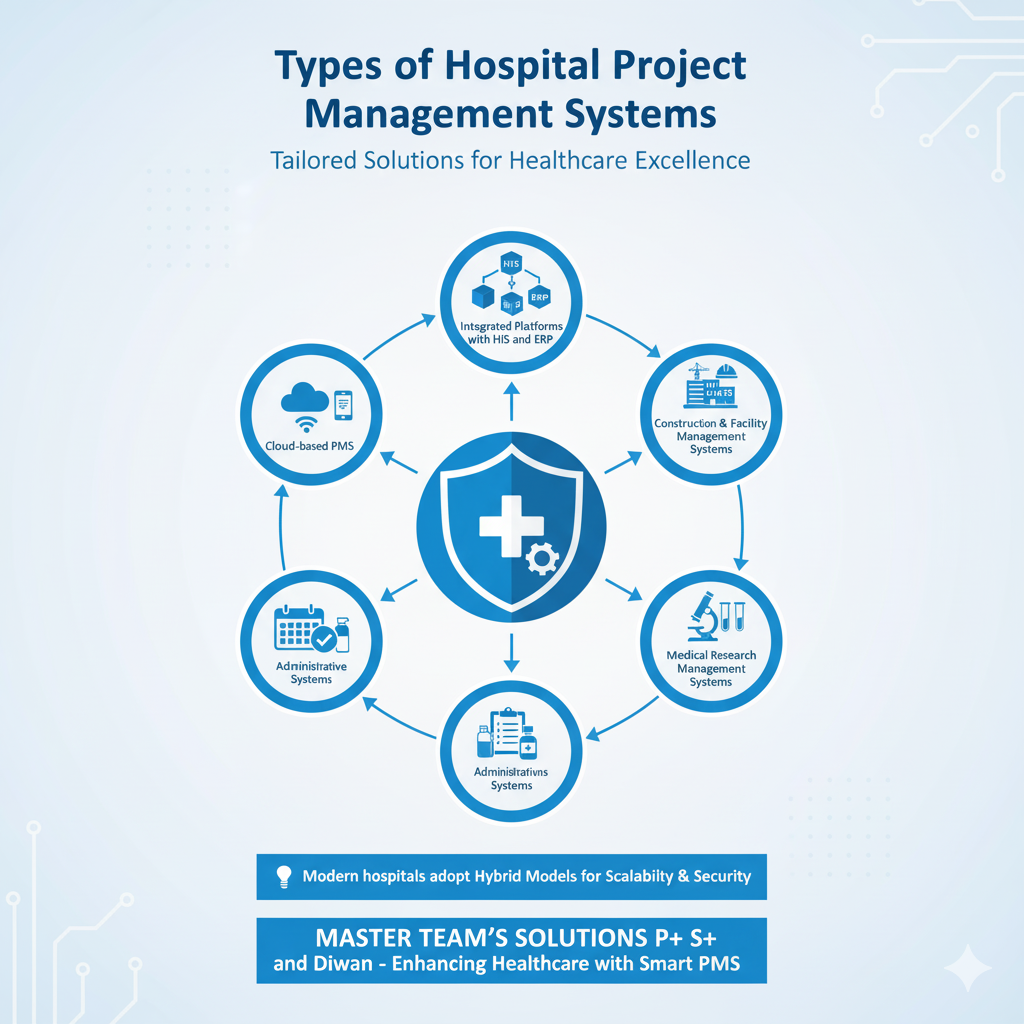.png)
Hospital Project Management System: The Smart Solution to Enhance Healthcare Efficiency and Reduce Errors
Imagine a hospital operating as a single, intelligent ecosystem, where medical and administrative departments communicate seamlessly and significant projects are executed with precision and delivered on time. This is no longer a vision of the future but a reality made possible through a Hospital Project Management System (PMS)—a comprehensive platform that unifies all types of projects, including:
More importantly, the system connects clinical departments (Emergency, Surgery, Laboratories) with supporting units (Human Resources, Finance, Logistics) through a centralized database.
With interactive dashboards that transform raw data into clear Key Performance Indicators (KPIs), hospital leaders gain the ability to improve outcomes, minimize delays, and enhance coordination across teams—directly boosting patient safety and overall efficiency.
A Hospital Project Management System (PMS) is an integrated digital platform designed to plan, execute, and monitor every type of hospital project—ranging from construction and facility upgrades to clinical research and service improvement initiatives. With PMS, hospital teams can track each project phase in real time, from planning and resource allocation to monitoring and final delivery.
For example, the system enables the creation of Gantt charts to visualize project timelines, provides task tracking tools to monitor progress, and offers interactive dashboards to measure performance through clear KPIs. By consolidating all this information into a single digital hub, PMS ensures that medical and administrative teams share the same accurate data—eliminating scattered paper-based records and reducing the risk of delays and errors.
Hospitals operate in highly complex environments where overlapping projects—such as expanding departments or upgrading facilities—often lead to delays, miscommunication, and costly mistakes. Relying on paper records or disconnected spreadsheets increases the risk of lost files, supply shortages, and incorrect purchase orders, all of which directly impact both budgets and patient care.
The challenge becomes even more critical during shift changes, where studies show that up to 80% of serious medical errors are caused by communication breakdowns among staff.
A Hospital Project Management System (PMS) addresses these issues by:
By ensuring accurate information sharing across departments, PMS not only reduces operational delays and financial waste but also enhances patient safety and elevates the overall hospital experience.
A Hospital Project Management System (PMS) improves efficiency and reduces errors by integrating both medical and administrative departments into a unified, centralized platform. This integrated approach streamlines hospital operations, ensuring better coordination and data management across various functions.
Here’s how a Hospital PMS enhances hospital performance:
This approach aligns with Saudi Arabia’s Vision 2030, which aims for a digital health transformation across the Kingdom, including the integration of hospital systems and the creation of a unified electronic health record (EHR).
Hospital Project Management Systems (PMS) vary according to the nature of the project and the specific needs of each hospital. The main types include:

💡 Modern hospitals often adopt hybrid models—combining cloud flexibility with ERP integration—to achieve both scalability and security while aligning with international healthcare standards.
Hospital Project Management Systems (PMS) are tailored to the specific needs of each hospital and the nature of the projects being managed. These systems help hospitals streamline operations, improve efficiency, and ensure the smooth execution of complex tasks across different departments. The main types of Hospital Project Management Systems include:
Modern hospitals often adopt hybrid models, combining cloud flexibility with ERP integration. This approach helps hospitals achieve both scalability and security while aligning with international healthcare standards.
Adopting a Project Management System (PMS) in hospitals is no longer a luxury, but a necessity to ensure operational efficiency, improve patient experience, and reduce errors and costs. With Master Team’s P+ platform, hospitals can seamlessly manage both medical and administrative projects on a single integrated system—fully synchronized with existing hospital solutions such as HIS and ERP.
If you are looking for a trusted partner to support your digital transformation journey and enhance healthcare project management, connect with Master Team today to discover how their solutions can elevate your hospital’s performance.
A PMS helps hospitals overcome traditional challenges that negatively affect efficiency and healthcare quality, including poor coordination, data loss, and high costs.
Not necessarily. The level of need depends on the hospital’s size and the complexity of the project. Large hospitals—especially those at universities and specialized medical centers—benefit significantly from PMS due to their continuous expansion projects and complex clinical trials. Smaller clinics or polyclinics may not require a fully advanced system and can rely on simpler solutions for appointment scheduling and routine task management.
Integration typically occurs through APIs or standardized data exchange protocols. For instance, a Project Management System can be connected to the Hospital Information System (HIS) and Electronic Medical Records (EMR) to enable automatic data synchronization across platforms.